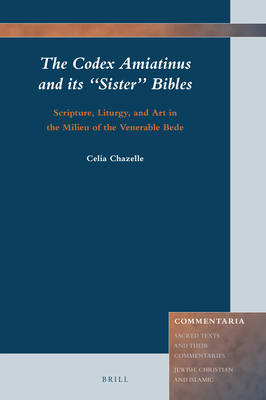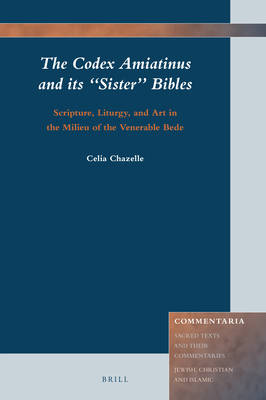
Bedankt voor het vertrouwen het afgelopen jaar! Om jou te bedanken bieden we GRATIS verzending (in België) aan op alles gedurende de hele maand januari.
- Afhalen na 1 uur in een winkel met voorraad
- In januari gratis thuislevering in België
- Ruim aanbod met 7 miljoen producten
Bedankt voor het vertrouwen het afgelopen jaar! Om jou te bedanken bieden we GRATIS verzending (in België) aan op alles gedurende de hele maand januari.
- Afhalen na 1 uur in een winkel met voorraad
- In januari gratis thuislevering in België
- Ruim aanbod met 7 miljoen producten
Zoeken
The Codex Amiatinus and Its "Sister" Bibles: Scripture, Liturgy, and Art in the Milieu of the Venerable Bede
Celia Chazelle
€ 126,00
+ 252 punten
Omschrijving
The Codex Amiatinus and its "Sister" Bibles examines the full Bibles (Bibles containing every scriptural text that producers deemed canonical) made at the northern English monastery of Wearmouth-Jarrow under Abbot Ceolfrith (d. 716) and the Venerable Bede (d. 735), and the religious, cultural, and intellectual circumstances of their production. The key manuscript witness of this monastery's Bible-making enterprise is the Codex Amiatinus, a massive illustrated volume sent toward Rome in June 716, as a gift to St. Peter. Amiatinus is the oldest extant, largely intact Latin full Bible. Its survival is the critical reason that Ceolfrith's Wearmouth-Jarrow has long been recognized as a pivotal center in the evolution of the design, structure, and contents of medieval biblical codices.
See inside the book.
See inside the book.
Specificaties
Betrokkenen
- Auteur(s):
- Uitgeverij:
Inhoud
- Aantal bladzijden:
- 662
- Taal:
- Engels
- Reeks:
- Reeksnummer:
- nr. 10
Eigenschappen
- Productcode (EAN):
- 9789004390133
- Verschijningsdatum:
- 17/01/2019
- Uitvoering:
- Hardcover
- Formaat:
- Genaaid
- Afmetingen:
- 157 mm x 239 mm
- Gewicht:
- 1020 g

Alleen bij Standaard Boekhandel
+ 252 punten op je klantenkaart van Standaard Boekhandel
Beoordelingen
We publiceren alleen reviews die voldoen aan de voorwaarden voor reviews. Bekijk onze voorwaarden voor reviews.









